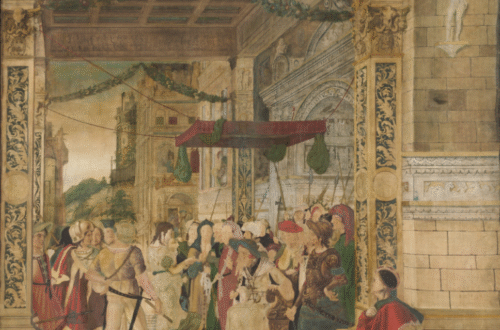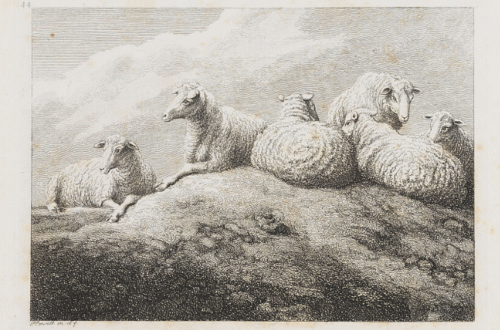We continue with Jacob’s story after leaving off with the dispute over a birthright with his older brother, Esau (first born son of Issac). Having a birthright would mean obtaining the highest position in the family, and receiving a much larger portion of inheritance, including land. However, as we remember from the last chapter, Esau sold his birthright to Jacob for the low price of a bowl of stew.
To claim the birthright, Jacob and his mother managed to deceive Isaac into offering this blessing to Jacob. When Esau came forward to receive his birthright, he became intensely angry. Isaac also grieved when discovering that he had been deceived and blessed the wrong son.
Upon researching this text and its interpretation from the Jewish point of view, Rabbi Joseph Telushkin notes at least two problems. 1) Rabbi Telushkin states “the Torah never explains why a blessing given under false pretenses cannot be reassigned to its proper recipient,” and 2) Jacob lied to his father. We have to wonder, how did Jacob get away with deceiving his father? And, if ever there is a point where one is expected to respect their dying parent, especially an honorable Patriarch like Jacob, at what point has his sin ever been made justifiable?
From this point, we move back into the text, Genesis 28:10-11 (NRSV):
10 Jacob left Beersheba and went toward Haran. 11 He came to a certain place and stayed there for the night, because the sun had set. Taking one of the stones of the place, he put it under his head and lay down in that place.
All of this happened while Jacob was fleeing from his brother Esau. His journey to Haron is believed to have been over 400 miles. As he gets started, about 50 miles from home, he has this dream, Genesis 28:12-15 (NRSV):
12 And he dreamed that there was a ladder set up on the earth, the top of it reaching to heaven; and the angels of God were ascending and descending on it. 13 And the LORD stood beside him and said, “I am the LORD, the God of Abraham your father and the God of Isaac; the land on which you lie I will give to you and to your offspring; 14 and your offspring shall be like the dust of the earth, and you shall spread abroad to the west and to the east and to the north and to the south; and all the families of the earth shall be blessed in you and in your offspring. 15 Know that I am with you and will keep you wherever you go, and will bring you back to this land; for I will not leave you until I have done what I have promised you.”

Jacob has an encounter with God. First, one might wonder from this text, why did God choose him? If this was a man who was clearly guilty of deceiving his father, why would God choose such a man to reveal himself to? However, if we look toward the New Testament, one is able to see that God doesn’t always reveal himself to those whom we should judge as the best of God’s creation. If we ask why God would choose Jacob, we should also ask why God chose Paul to be an Apostle.
When looking at this encounter between God and Jacob, we can see that Jacob is not being judged for his former sins. Instead, God offers future blessings to a man who has stolen blessings. God gives Jacob undeserved recognition in saying, “all the families of the earth shall be blessed in you.” But the best promise, God says, “know that I am with you…for I will not leave you.”
Many of us have been like Jacob. Our life’s journey has taken us to some places where our behaviors have bordered on the unethical. Some might call this guilt-ridden, leaving us to wonder, where is God? And, if God is out there, why would he have anything to do with me?
To some point, it is easy to understand why some people are agnostic when it comes to faith. Some may even admit that they believe in God but just don’t think God would have anything to do with them; sort of like God is on vacation, taking a break after creating the world. It is difficult for people to acknowledge that God is working in their personal life at this very moment. For some, it’s easy to be content with our life and live with very little awareness of the existence of God. Yet, it isn’t until our lives encounter a tragedy, say the death of a loved one or a sudden terminal illness, that we drop down to our knees in prayer frantically searching, asking “God, where are you?!”
This can be especially frustrating when we hear stories of Jacob and his direct encounter with God. We look at Jacob’s past and we wonder why he was allowed to become a famous biblical leader. We will never understand the kind of justice or injustice done by this story but what we do know is that God revealed Himself to Jacob, which assures us that God is capable of being present with the sinful.
Many people today assume God will have nothing to do with them because they are not perfect enough to have fellowship with Him. Yet, what we learn from this story of Jacob is that the idea couldn’t be further from the truth. From this one story and the many that follow, we see example after example of how God has chosen to have company with many men and women who’ve lived sinful lifestyles.
When we think about God’s willingness to be in company, and have communion with sinners, we ought to know that whatever spiritual state many of us may find ourselves in, God is always with us. There are reminders throughout the Old Testament where God says, “I am the LORD, the God of Abraham,” or “the God of Israel,” or “the God of your fathers.” This is even continued by Jesus in the New Testament, that even Jesus’ name, Emmanuel, means “God with us.”
In continuing with Jacob’s story, Genesis 28:16-19 (NRSV):
16 Then Jacob woke from his sleep and said, “Surely the LORD is in this place--and I did not know it!” 17 And he was afraid, and said, “How awesome is this place! This is none other than the house of God, and this is the gate of heaven.”
18 So Jacob rose early in the morning, and he took the stone that he had put under his head and set it up for a pillar and poured oil on the top of it. 19 He called that place Bethel.
After Jacob awoke from his dream, he set up a pillar, and named the place Bethel. The name Bethel may have two meanings, 1) the house of God, and 2) the gate of heaven. This helps support the idea that whenever God is, it is holy. Therefore, if God is present with us, then we can continue to acknowledge “surely the LORD is in this place. How awesome is this place! This is none other than the house of God, and this is the gate of heaven.”
To conclude, in times of trouble and heartache, many of us ask “Where is God?” Jesus said in the closing words of Matthew’s gospel, “I am with you always, to the very end of the age” (Matthew 28.20b, NIV). Where is God? God is with you. He is with you today. He will be with you tomorrow. God will never leave you.
Sermon Title: Where is God? Sermon Date: July 18, 1999, First Christian Church, Paradise, California




